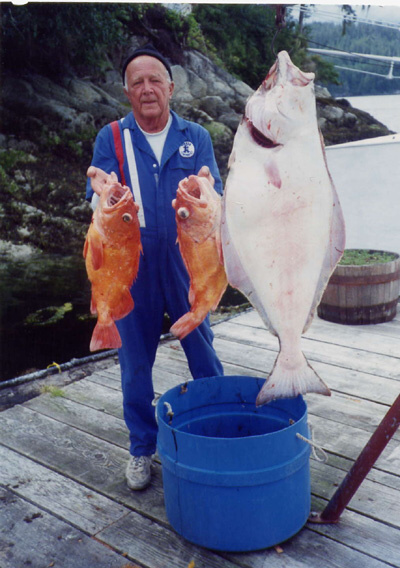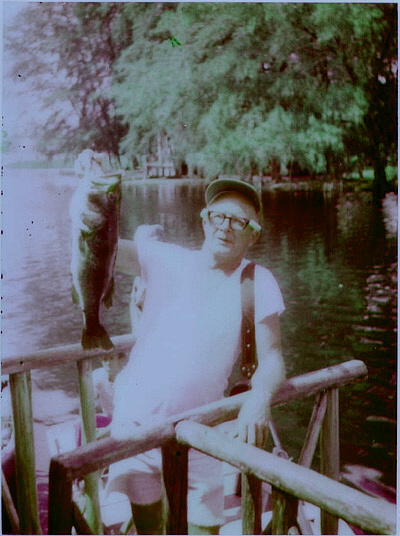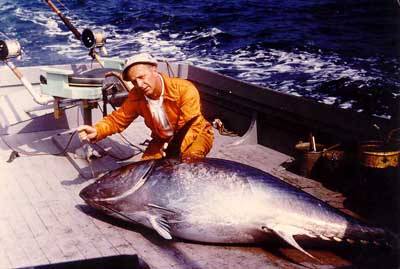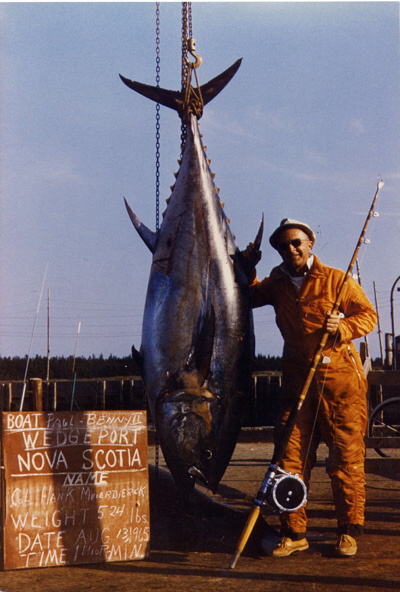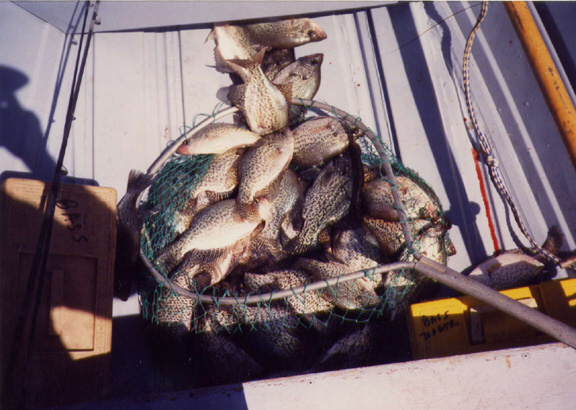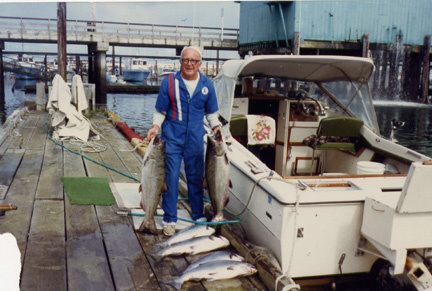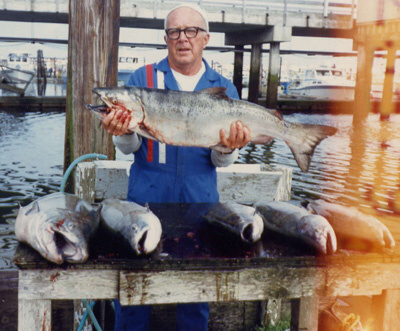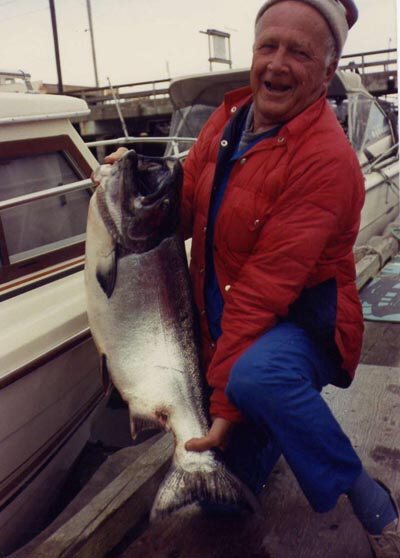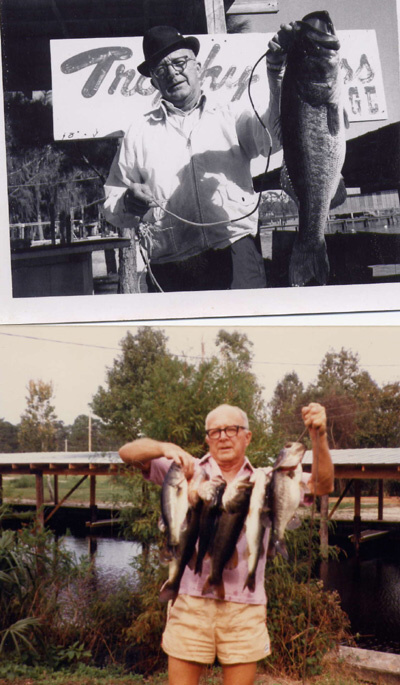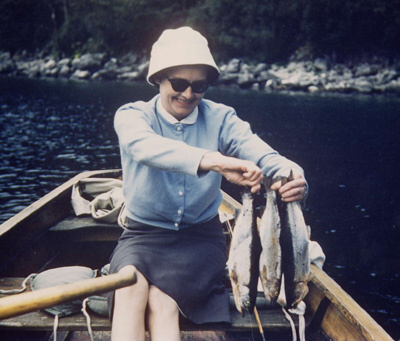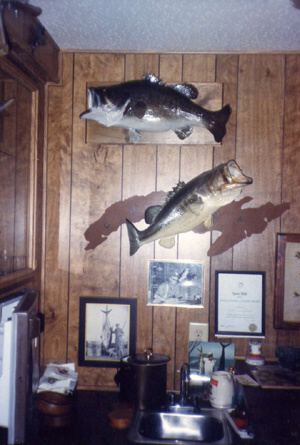 |
| Scene in my present bar. 11 lb and 13 lb-2oz bass |
The scene changes. I'm about 13 years old and visiting my Aunt Mateel in Long Beach, Long Island, N Y. I was fishing off a dock on the bay side and having no luck at all. A very elderly gentleman came up and started to fish right next to me. It seemed that every time that he dropped his bait in the water, he had a fish on. I never did catch one and I'm sure that he had at least a dozen. I left very disgusted and perplexed. But that's the way that it goes sometimes. I've been skunked many times after that but that episode sticks in my mind, maybe it was because my ego was bruised.
I stayed at my Aunt Mateels beach front house at the foot of Virginia St. in Long Beach, L.I., N. Y. After not catching any fish, I still had some bait left in a bucket by the gate in front. I was all dressed up and we were going out to dinner when my Aunt Mateel told me to get rid of the smelly old bait.
I stepped out the gate onto the beach and was thinking of the cook in 'Mutiny On The Bounty', when he stepped out onto the ships deck, wet his finger to find out which way the wind was blowing and promptly threw the contents of the bucket into the wind. You know the result. Well I did the same thing and had to go into the house to change my clothes and take a shower.
Some of my earliest fishing was when I was 11 years old and we lived in the Adirondack mountains of N Y. There was a lake, called Loon Lake, about 1000 feet through the woods and we would go over there with a pole, line, hook and some worms. We caught yellow perch and some catfish. There were also a lot of frogs at the lake and we would go out at night and gig them. The lure was a piece of cloth on a hook and I dangled it in front of them. The hooked ones would be put in a fenced enclosure until there were a sufficient number for a family meal.
Many years ago, Millie and I were towing our rig along highway 98 in Florida near Port St. Joe and decided to drive along the peninsula and out to the point, about 15 miles, to camp on the beach. We found a beautiful isolated spot and camped right there. There wasn't a person for miles. We could see Port St. Joe in the distance but nothing else. I think that the area now is called 'St. Joseph Peninsula State Park', out highway 30E.
We had a nice dinner and a drink or two and after dark, at the low tide, I decided to walk in the shallow surf and see if I could gig a few flatfish that normally lay in the sand. I had a gig, so off we walked in the water about one to two foot deep. It was warm and we were enjoying the walk when the water seemed to be a little deeper. Now, two feet and then three???
I was using a fluorescent lantern to look for the fish and the light was diffused with no beam. The incoming tide was now up past our knees and lapping at our belly buttons. Which way to go???
The flashlight was of no use and there were no discernible landmarks in the dark. I then made the decision. Rather than keep walking and possibly drowning while swimming out to sea, we would stop and determine where we were. I shut off the light and we stood there in the dark with the water still rising. !!!FUN!!!!
All that we could see was nothing. After about three to five minutes, with our eyes used to the dark, I slowly turned about and looked in all directions. I did see some lights in the distance and decided that they were at Port St. Joe and that we would head for them, even if we had to swim the thirteen miles. We headed that way and went as deep as our armpits and then the water became shallower and we finally were on the beach. I think that we were only about 150 feet off the beach but if we went the wrong way, it would have been a LONG swim.
Being happy that we were still alive, we walked the beach back to camp. Millie says that I went out again looking for fish but you can bet that I kept the shore in sight. Oh!, I never did gig a fish.
I might as well let you know right now that once in awhile I can goof. I owned a 12 foot, round bottomed boat, (Don't ever buy a boat or any fishing gear at Sears). I used it on a very calm and slow flowing river in Virginia. I never caught many fish but that is not my story.
One day I stopped the boat next to a very steep wall and for some reason, put my foot on a protruding rock with the other foot still in the boat. You guessed it, the boat started to move out from the shore, my legs stretched as far as possible and my hands were holding onto a bush. There I was, what to do?. The only alternative was to let go of the bush, drop into the water and try to swim and catch the boat. Lucky me, there was another boat about 100 feet away and they responded to my frantic supplications and rowed over and pushed the boat towards shore and I recovered my normal seat. WHEW.
Time goes on. Near Panama City, Fl., the commercial boats, that fish for sharks to extract the vitamin A from their livers and cut off their fins for soup, are berthed.
Twice I made arrangements to ride along with them. A very interesting experience. On the way out they would harpoon porpoises and cut them up for bait. Their flesh is very bloody and an attractant to sharks. This bait was put on very large hooks that were attached to a mile long chain, then they would put out this chain with markers to show where the ends were. The next day they would retrieve the chain by means of a powerful winch.
If the sharks had been on the hook for a long time, they would be almost dead but if they had been hooked just a few hours earlier, they could be quite lively and dangerous.
 |
| A trip out of Panama City, FL for Great White Sharks |
On both trips they caught a Great White that was at least 20 feet long. The sharks were piled on the deck and taken to a moorage on an island where they would cut off the fins and hang them on a wash line to dry, The oil was extracted from their livers and put into barrels and sold to Borden Co. who processed it for the Vitamin A.
On the day that I arrived in Panama, I was very lucky in a poker game and was able to send for Millie and Gail and to have them come to Panama over the Christmas holidays. {That is another story worth telling} Mildred was pregnant with Jay at the time so when she arrived I gave her $50 to buy some new clothes, after she had the baby. A few days later I saw a Tonkin cane surf rod in the P X and there went the $50.
The Chagres River was close to our base. This is world famous for it's tarpon fishing but I was never able to land one. Another skunk! Not too bad though considering that for every 10 strikes you get one hookup. And for every ten hookups, you land one tarpon, if you really are a good fisherman and the fish doesn't manage to disengage itself.
My favorite quest is for largemouth bass. Luckily, I've been able to fish for them on some of the best lakes in the world, like those in Florida, Mexico, Texas, California,, Arizona and Cuba. n fact, I was the resident pro in Cuba for nine trips. More about that later. My brother George owned a fish camp on the St. Johns river in Florida, close to where Big and Little Lake George meet. The nearest town of any was Palatka Florida. His camp was named Trophy Bass Lodge.
I spent many days fishing there and always caught bass, mostly during the spring when the bass were spawning. We used river shiners for bait, that we caught in the nets that my brother had set out in the river. He also sold the excess shiners that he caught. He had ten large 10 by 10 foot nets and they were held in place by four poles. I always had a goodly supply of bait and I caught many fish but as in all fishing, sometimes you were skunked too. If you pulled the nets at night, they would be loaded with small catfish.
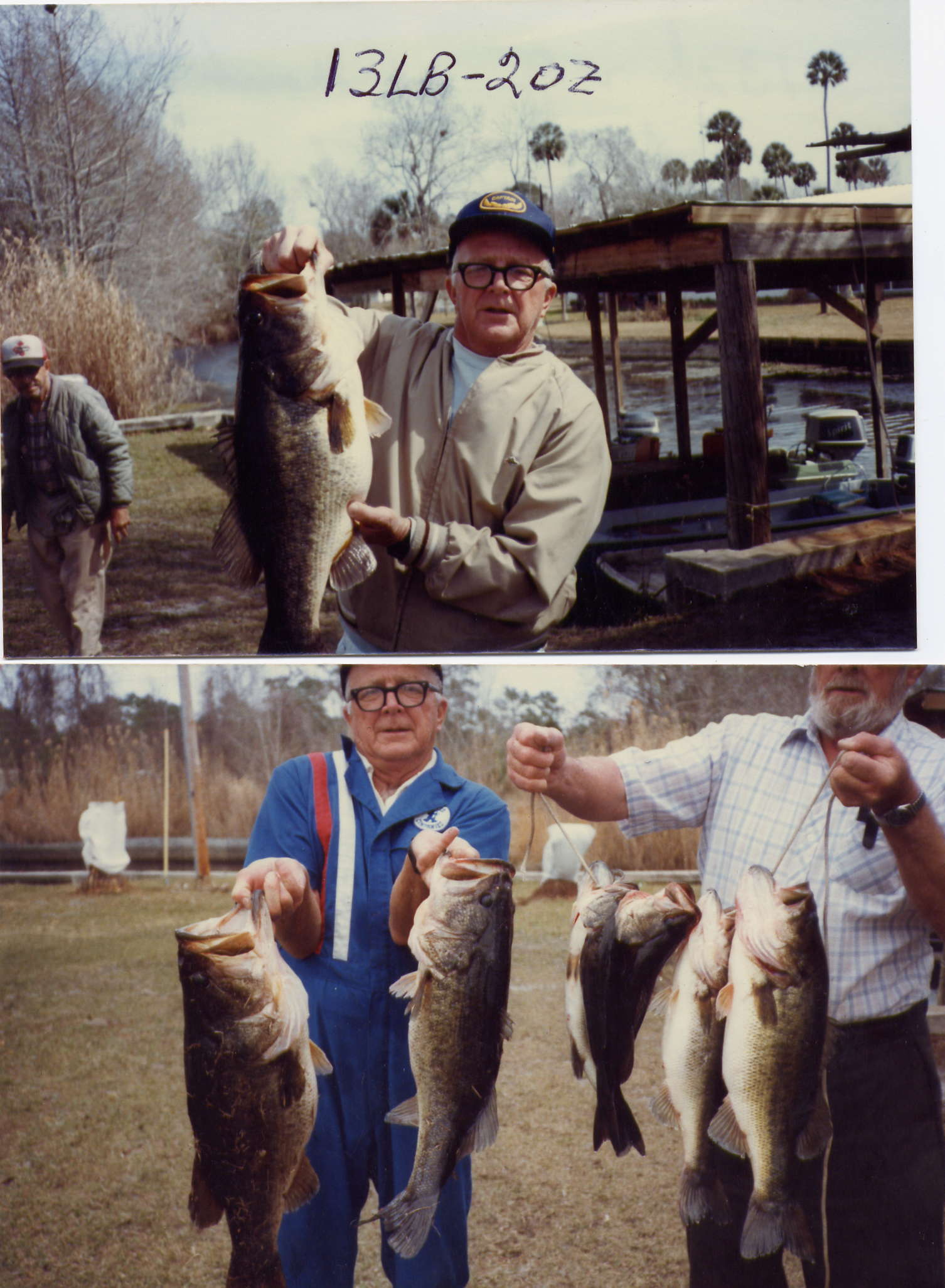 |
| Top: 13 lb-2 oz bass from the St. Johns River, FL.
Bottom: Nice morning catch from the St. Johns river FL at my brother's Trophy Bass Lodge. |
George and I also took a trip to Eastern Canada for bass and trout. Even though we fished many lakes in Ontario, we never caught any fish. To solve this we hired a guide to take us out. The same story, no fish. George and I began saying that if he didn't show us some fish by a certain time, we were going to throw him overboard. As the time approached, he got very nervous but we didn't toss him over.
The largest bass that I've caught was 13 pound 2 oz. and I have it hanging in my bar right next to a 11 pounder that I caught in Cuba. [MORE INFO LATER]
I've done a lot of salt water big game fishing in Mexico. For about 14 years we took our trailer to Rincon De Guayabitos in Nayarit which is about 40 miles north of Puerto Vallarta. We camped at a place named Tropico Cabana Trailer Park. Our sites were situated very close to the beach. Here we launched and recovered our boats through the surf. We would spend the four winter months there and fish about four days a week. We filled the freezer with Dorado [Mahi Mahi] and canned many cases of yellow fin tuna. There were lots of Pacific Sailfish [up to 120 lbs.] caught and a few Marlin were also boated plus Wahoo and a variety of other fish. We would start our trolling of three lines about seven miles out where the blue water started. You would look for a trash line or any floating debris because that was where the Dorado hung out.
A Dorado is what we called a Bullheaded Dolphin.
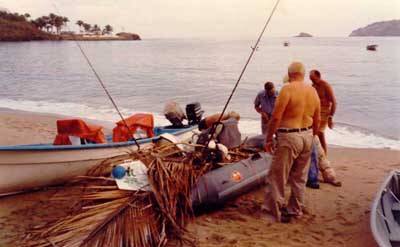 |
| Launching my own Dorado luring island at Tropico Cabana RV park in Rincon de Guayabitos, Mexico |
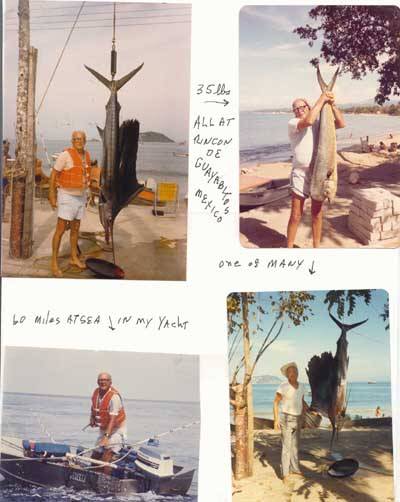 |
On one occasion I was about 30 miles out and had a sailfish on. In those days I used an Avon 12 ft. inflatable boat. Well, I got the fish close to the boat and then he started a sawing type motion and was lunging at the boat. Before I could counter him, he put his bill into one of my rubber pontoons. I boated the fish and gave it to friends that were nearby and then slowly trolled toward shore. I caught a nice Dorado and then I realized that the pontoon was leaking a lot of air. Off I went at full speed and ran it up on the beach. I got a good razzing from my friends but I was able to fix the leak and a few days later I was back on the ocean.
The same thing happened once again. This time I had him hooked on my short heavy duty marlin rod. As he approached my rubber boat, he again started the sawing motion. But now I was prepared for his antics and used my rod to fence with him. After about four or five minutes of this, I poked him in the eye and he backed off. I pulled him closer and with my gloves on, grabbed his bill. He didn't like that and since he was still very 'GREEN' [meaning, not the least bit tired] we then ended in a pumping match with him doing most of the pumping and me hanging on.
Finally I was able to wear him out and boat him and since he was hooked in the bill and not hurt, I released him. Besides, I already had many bills from previous catches in my collection at home, in the garage. I never keep a Sailfish that is bill hooked since they are not injured in any way. The ones that I keep, and give to the natives, are the ones that are hooked in the mouth and are bleeding since the sharks will get them in a few minutes.
Once, about twenty miles at sea, I was trolling and looking back at my lures when I hit something solid with the boat, What a shock cause there was nothing in sight that I could collide with. It turned out that I had hit a large sea turtle that was basking on the surface. It got my attention, to say the least.
On another trip about 20 to 25 miles out, with nothing in sight, I stopped to have my lunch. After sitting quietly for about ten minutes, I was startled to hear a noise similar to a freight train bearing down on me. I jumped up and looked and saw a large whale about 100 feet behind me 'blowing'. I started the motor and went about a mile away and settled down to finish my lunch. The same thing happened again about ten minutes later. Were they doing this on purpose just to play with me or scare me? Whatever, it worked, and I was scared for a few seconds.
To find where the tuna were, we left at 0600 in the dark and headed out due west on a 270 degree compass heading, at full speed [20 knots average] for three hours. Then we would put our lines out and troll and scan the horizon for any activity. We were looking for birds since they would hover over the tuna and spinning porpoises and feed on the scraps of the bait fish. You would not believe the maelstrom on the water with feeding birds, spinning porpoises jumping and other fish breaking water.
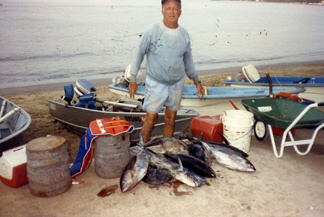 |
| A nice mess of tuna |
When you hooked up with a tuna, it was quite a fight to get it in the boat. In the meantime the school of fish has moved on and the chase was on again. After three or four hours of this activity, you are dead tired, sunburned and the bottom of the boat is awash with fish and blood, It's time to head for shore, about 60 to 75 miles away. You found your way back by going east on the compass until the mountains came into sight on the horizon and then you adjusted your heading to find home. A very long day. Now you have to clean the boat, cut up the fish and ice them down so that they could be pressure canned the next day. FUN???
A trip out was always beautiful and different. I've seen lots of whales jumping and splashing back into the sea. The resulting splash and foam reminds you of a large airplane that might have crashed into the ocean. Many is the times that I have run over Manta rays with a wingspan of over 15 feet [I've hit several of them while trolling] and one even hit my hand with it's wing while I was holding the side of the boat. I've also seen thousands upon thousands of small spotted rays in a school that stretched for miles plus the always present porpoises that raced under your prow and were impossible to lose regardless of how abruptly you maneuvered your boat.
Another Mexican spot where I liked to fish was Cabo San Lucas. This is famous for large game fish, especially Marlin. The first thing that you need to do to fish for Marlin is to catch some bait. This is done by going to a special spot and putting a 'Little Joe' down deep. This lure is a series of about eight small hooks on a line and each hook has a small tuft of wool to attract the mackerel. A lot of bait is needed since it is very difficult to keep them alive in my small boat without a live bait well. Also the thing to do while catching bait is to put the first one on the hook of the heavy line rig and let it 'free line' or swim around just in case a large fish is in the area. I did this and 'Surprise'.
After I had enough bait, I tried to reel in the heavy line but I felt great resistance and it was obvious that something heavy was on the line. I motored along to retrieve the line and saw that I had hooked a Thresher Shark. Each time that it moved it's tail, we went for a ride. I estimated it to be 11 feet long and weighing about 11 hundred pounds and me in a 13 foot aluminum boat.
I followed it for about two hours, hoping that I could figure out some way to subdue it. I finally decided that the fish had won so I got as close to it as I could [it stayed about 6 to 8 feet below the surface and was in plain view.] and cut the line. I doubt that the shark even knew that he was hooked up to my boat.
So off I went to try to catch a Marlin. While trolling off the coast among the large charter boats, with a chop of about one to two feet, I felt a spray and noticed that the constant pounding had opened a seam in the front of the boat. Off I raced for shore and ran it up on the beach. That was the end of the fishing for that trip. I loaded the boat on top of my pickup and headed for Fresno Ca. to get it repaired. Another skunked day.
I've fished all the major lakes in Mexico and several times have landed over 100 bass in a day, I've also had many adventures, like having my outboard motor stolen plus being held up on the lake and everything stolen while they held a gun aimed at my chest. Read on !!
Bandits showed up at a lake called Comendero that was about 80 miles east of the main highway just south of Culiacan. [the drug center of Mexico.] It all started on a cold drizzly afternoon when Ben Tang, Mickey Toliver and myself were in Mickey's bass boat near the shore, about 15 miles up Lake Comendero. I saw a small boat out on the lake but paid no attention to it. A few minutes later I looked up and it was coming at us at a high rate of speed. It swerved and pulled up short of us and 5 men stood up in the boat. Three had automatics, one a revolver and one a sub-machine gun. We all raised our hands.
They asked for money, Mickey had 350 dollars and gave it to them. They wanted cigarettes, we had none, they asked for gasoline, all that we had was in the boats tank.
Then they made us get out of the boat and climb a steep bank. Three of the bandits followed us up the bank and each one kept a gun aimed at our chests. The other two ransacked the boat, took all our rods, tackle boxes, binoculars, and anything else of value. This took about twenty minutes and all the while the guns were pointed at our chests. Finally the leader threw the boat keys overboard and tore a handful of wires loose. [luckily the wires only went to the fuel tanks] Then they all got in their boat and raced away, shooting in the air.
We have a problem Houston!!! It was getting dark, rainy, no boat keys, no extra food or warm clothing and nobody knew where we were. etc. etc. Our boat was about12 feet off the shore, in the brush. Mickey got undressed to swim out and retrieve the boat but I was able to hook it with a long branch and pulled it to shore.
About 100 yards away was a small island that faced the main part of the lake. We used the trolling motor to get us to the island. I told Ben that I would try to gather some dry brush to make a signal fire and to keep dry and he should try to rewire the ignition so we could use the boat to return to camp. After about 15 minutes, Ben called to me to come off the hill. He said 'I just remembered that I put a set of spare keys in the boat, now I've got to find them' It took about 5 minutes and he found them and we started back up.
We were living in a Bass Outfitters enclosure and happy to arrive there. It was next to a very small village. At various times during the night I was awakened by a total of 14 shots. The next morning we pulled out our bass boat and headed for civilization. Did we call the Police? 'Hell no'. We checked with a local American and he told us that it would cost us about $300 to get a cop out from town and there was nothing that the police could do to help us. They would have cost us a lot of problems and money too.
So it goes. Things got a lot worse in that area and finally the Army came in and cleaned it up, so they tell me. They claimed that they caught the bandits and had them all in jail, Even sent me a FAX of their pictures and a newspaper article but nobody believes it was the same five. The locals say they know who they are and what ranch they live at but nobody is going to go in and bring them out.
Back to Northern Mexico. Millie used to go with me to Lake Dominguez, near El Fuerte. To get to the lake you had to follow an irrigation canal for about ten miles and then cross a bridge to get over the river. This bridge was very narrow, had wooden planks across it and many of them were missing. At times, I had to get out and replace them so that my wheels wouldn't fall through. A scary ride to say the least. At the lake we had to cross the dam that had a 60 degree turn about half way across. It always seemed that it was impossible to do, but somehow I managed to make it.
At the lake shore we dry camped. The only life to be seen was an occasional boat and the cattle that seemed to like to eat everything in camp. Bass fishing was great! One day about six of us caught enough to fill the back of a pickup. It took until midnight to fillet them by our Mexican helpers, There was no fear of 'Bandits' in November 1999.
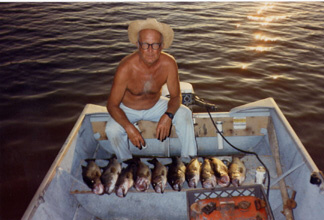 |
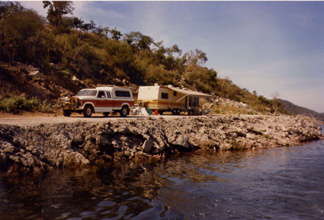 |
| An afternoons catch | Millie and I camp at Lake Dominquez |
My friend Mickey Toliver from Tempe AZ. {The same fellow that was with me when we were held up in Mexico} called and asked if I would like to do some bass fishing in Mexico. I jumped at the chance because I hadn't done much bass fishing during the past two years and I would be with a couple guys that I had fished with before. I loaded up my truck and drove to Tempe AZ. and spent the night with Mickey.
The next morning we loaded his 27 foot motor home with all our gear and he, Ben Tang and I headed south. Ben was driving the suburban so we had two vehicles to use. Crossed the border without too much trouble and since it was getting dark, we stopped at a small trailer park in Santa Ana Mex. for the night. The next day we went on to San Carlos Mex. and stayed at Mickey's house. A beautiful house overlooking the Marina and bay.
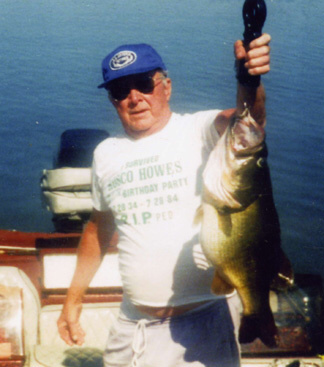 |
| An even 11 lbs at Lake El Salto, Mexico |
At Lake Salto we pulled into a fish camp of a 'good friend', Billie Chapman Jr. We asked to park our motor home there and we were told that he wanted $150.00 per night, just to park. {Some good friend} We were already committed with the boat in the water so we stayed the night. We fished for a short time and we each caught about 15 bass.
I talked to some Mexicans and was told that 150 yards away we could park for free at the waters edge. Great! At this spot was a man named Nacho, and he said that we could camp there and also we could put our bass boat right on the shore. Perfect. We could go out fishing and he would guard our motor home. The only drawback was the droppings of several horses, cattle and mules that were grazing in the area.
Here is where the local netters brought their tilapia to be loaded on big trucks to be sold in Mexico City. This was no deterrent to fishermen that could be on the lake for free. Upon leaving we tipped the caretaker lavishly insuring that we could park there again. [Note; this is about 3oo feet from Ben kings lease where I spent six weeks in 2001, Jay and Jan also spent a few weeks there, and We plan to fish it again in Jan. 2002.] I did.
The next morning we were out on the lake seeking the wily and elusive Largemouth Bass [called Lobino in Spanish] We did very well. I boated 47 fish and my buddies did equally well. A long but fruitful day. Early to bed and up at 0430 the next day to fish again.
It was another great fishing day and I boated an even 50 fish, all solid and great fighters. We threw most of them back as we had no large freezer with us. The following day we changed our tactics and used more spinner baits in the brush. I boated an 11 lb. 0 oz. bass. Had it weighed at the fish camp and was able to release it alive. I would liked to have had it mounted but I already have two larger ones on the wall of my bar. Also, we had no way of keeping it until we could find somebody to mount it. Maybe I'll catch it again someday?
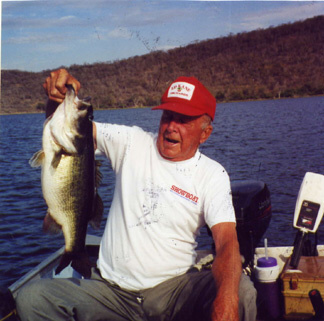 |
| An example of 3 one/half days catch of bass |
Later that same day, I had another 'Hog' on my line but with the boat moving against a tree, the wind blowing and my not letting line out for it to swim free, I lost it. My total for that day was 37 fish. The following day we tried for large fish with worms and spinner baits but the biggest that I boated was about six pounds. Total today, 23 fish. Remember my two friends are catching as many, if not more than I did.
Same routine, early to bed, fish stew for dinner and up before dawn the next day. We fished about half a day [I caught 19 more] and then we pulled the boat out and headed for Rincon De Guayabitos Mexico. {about 35 miles north of Puerto Vallarta] and stopped at Los Mochis for the night. We know some people there and we all went out for very good tacos. On further south the next day.
At Rincon we stayed at Mickey's house, another beautiful place on the beach. We had several dinners at friends, visited the trailer park where Millie and I had spent many winters but it was almost empty now.
Two days later we drove to Lake Aguamilpas, near Tepic and were able to park for $5 a night .The wind came up most every afternoon making it difficult to fish but we did fairly well in the AM. We averaged about 25 fish each per day and they were all healthy bass. My biggest was a little over 5 lbs. We fished for three days, visited Billy Chapman Sr. fish camp and then we drove back to Rincon.
On the way to San Carlos, Mexico, at night in a Suburban, the Chinese friend was driving and the speedometer read 155 km., that equates to 95 mph. I was scared. A rock in the road, mule, horse or whatever, and if we hit any of these or blew a tire at that speed, we are dead. I mentioned it in a nice way but he took affront to it and we are no longer friends. Good, at least I'm still alive to tell the story. All in all, it was a wonderful trip and I thank Mickey for asking me.
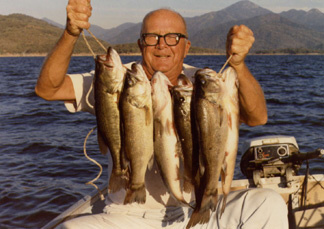 |
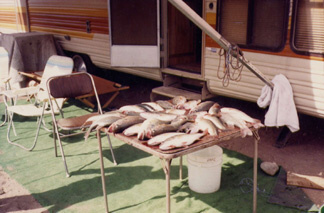 |
| Mexico bass | Mexico bass |
Back to Mexico in 2001. My good friend and longtime fishing buddy, Brigadier General Ben King, invited me to visit with him at the lakefront property that he leases at Lake Salto in Mexico. It is located 100 km. south of Culiacan and 100 km north of Mazatlan, then about six miles east toward Cosala. A beautiful and large lake on the river and is probably the best lake in the world for BIG largemouth bass.
I left Las Vegas on New Years day and arrived at the lake on 4 Jan. Ben King was there and two of his buddies from Texarkana, TX. and the two 'Man servants, POLO and ARMADA'. I must explain this right now. Ben leases the property for $300 a year but you must employ POLO too. Polo insures that nobody will steal, bother or in any way molest you. Armada is his son and is a very big strong fellow..
Their job is primarily security {If you leave the camp. they will stay there} and help in any way that you choose. Example: They help launch and recover the boat, unload it, bring the tackle in, clean the fish, keep the tank full of gasoline, chop firewood, make a fire in the evening, keep the area clean, wash all the dishes, shoot and clean doves, wash the truck, etc, etc,. Their wives even sent us some tamales and homemade cookies. No matter what we asked, they did it right away. This of course cost money. Ben, Jay and I's.
After I had been there for four weeks, Jay and Jan came down. This was the first time that Jay had gone bass fishing since he and I went to Lake Obregon about 30 years ago. We fished all day and every day and did quite well. Several times Jay caught more fish in a day than I did.
The fishing wasn't the greatest due to a series of cold fronts that passed through the area and kept the water temperature down. We did catch a lot of fish and many in the 5, 6 7 and 8 pound variety. Jay boated a eight pound fourteen ounce bass for his biggest. We went out every day, sometimes twice if it wasn't too windy. Once in awhile we would go to La Cruz, the nearest town, for gas, propane, water and any other supplies that we needed, even a pretty good dinner in a local restaurant. There are also several fairly good restaurants in Cosala, about 30 miles East.
For a little diversion the three of us drove over to Lake Comendero [this is where my friends and I were held up some years ago] for a day of fishing. We hired a PONGA and two guides and fished for about three hours. I caught three, Ben five and Jay thirteen. None of any and we decided that the terrible drive over there was not worth the effort.
I bumped into several old fishing buddies while on the lake and in general had a wonderful time. Hope that I'm able to return next year.
Jay and Jan spent a few days in Mazatlan and then toured Mexico. I spent one night there and went on down to Rincon de Guayabitos, the place where Millie and I used to spend our winters. There were very few of the old gang around and with the windy weather, fishing was lousy, so I didn't go out for Dorado or Sailfish. Made it home in four days.
Mexico is getting very expensive, Tolls alone are about $150 each way to Puerto Valarta, gas is $2.00 a gallon, food etc, also is very high and in the tourist areas, exorbitant. I hate to give them all that money but that is where the bass are. So it goes.
While on this trip I kept seeing the word Massacre, twelve people killed, in the Mexican papers. When I got to Mazatlan, I saw an English paper and found out that twelve people had been lined up and shot because the bandits could not find the man that they really wanted to kill over some drugs. The massacre occurred about 4 or 5 miles from where we were camped on the lake.
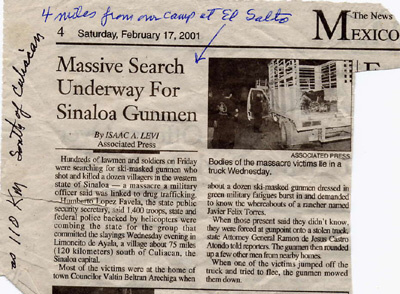 |
| Story of massacre within 4 miles of our camp |
I returned in 2002 to the same fish camp. It seems that my friends lost the lease on the property but were able to secure a five year lease on the property right next door. A group of Bens friends chipped in and are putting a concrete slab down, erecting the shower and cut two roads in so we can pull our trailers into the camping area.
We are right on the water and have a nice place to moor our boats. The old lease ended on 1 Feb and I had planned to move onto the new property when I got word that Jay and Jan wouldn't make it down, so I packed up and headed home.
I caught 293 bass during the 17 days that I fished but they were all small. Now there are too many commercial outfitters on the lake, too many tilapia netters and it is showing up in the catch. There are a few ten pound bass caught quite frequently but nothing like it was a few years back. Also the local politics on the lake are being fought over by the outfitters. A shame since there is constant turmoil and problems. Another great spot being ruined.
During the last few years I've joined my old Buddy Chuck Stratton and friends and we've gone to a place called Port Renfrew, British Columbia. It is situated close to the extreme southwestern point of British Columbia where the Straits of Juan De Fuca meet the Pacific ocean. There is a small fish camp about two miles up a stream and they have a dock where we can moor our boats and a large parking area where we camp.
From there we can go down the river and out on the ocean to fish for halibut, salmon and get a sufficient supply of large Dungeness crabs. This fishing is not for the old and decrepit. Here is a typical day.
Up at about 5 A M and onto the boats [we use one 25 foot and one about 19 foot] and down the river to the bay. Our destination is the Swiftsure Banks about 13 miles out. We eat breakfast on the boat on the way out. One morning breakfast consisted of a pot of cold string beans left over from the previous night. The water is always rough out there and the boat goes through many gyrations during the day and it is best to always have at least one hand on the rail and your gut pressed up against it for balance. This is the easy part.
